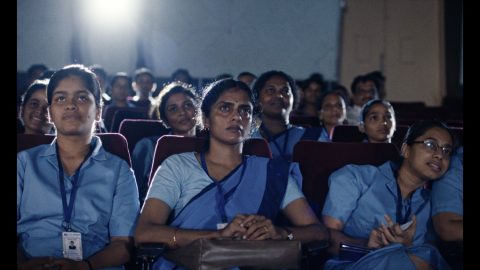I don’t want to say it’s a bad year for cinema. Having a bad year at the movies is a skill issue. For example, if you were to sit and watch Netflix Originals all day or to eat up blockbuster slop each time you left the house, it follows that your top ten would be filled with uninspiring cinematic visions. It might be an insane thing to say, having watched over at least 130 films released in 2024, but I didn’t see enough, making it a bad year for cinema, for me.
Perhaps my standards are too high. Perhaps I went to the wrong film festivals. Perhaps I spent too much time watching forgotten studio films from the 90s — Body of Evidence (Uli Edel, 1993), Wolf (Mike Nichols, 1994), Backdraft (Ron Howard, 1991), fucking Striking Distance (Rowdy Herrington, 1993), etc. Whatever happened, I’m just not happy with my top ten this year.
Nonetheless, due to popular demand (one to two friends), I thought the world deserved to know which releases made the cut, as well as some of my favourite first-time watches. As a bonus, editor-at-large Jared Abbott has also sent in some of his top picks.

1. Anora (Sean Baker)
Russians in American movies are usually thick as pigshit, have no qualms with criminal enterprises, drink copious amounts of vodka, say na zdoróvʹje all the time, cannot enunciate their words and are the epitome of the world’s moral failings. Among Europeans, only the Serbians and Albanians (portrayed as warlords, organ harvesters, people traffickers, etc) have it worse. That’s why I found Anora (above), Sean Baker’s Brighton Beach-set comedy-cum-drama-cum-state-of-the-nation-address, so endearing.
There might be an oligarch’s son, and various illegal shenanigans might be going on, but for once, they’re not gangsters. They’re just Russians, you know, people. They have to call the Armenians — slightly useless; boomer-coded — to get things done. Baker, who cast the movie himself, makes great use of Mark Edelshteyn and Yuri Borisov, creating a genuinely nuanced portrait of the Russian-American experience. Not only is this the most significant film in the micro-genre since Brother 2 (Aleksey Balabanov, 2000), but it’s also a deeply funny yet poignant exploration of a fantasy, a salt-of-the-earth sex worker cosplaying as a high-class lady before everything piles on top of each other with anarchic glee. Secured first place due to that bizarre Take That needle drop.
2. Sterben (Matthias Glasner)
When I saw there was a three-hour German movie at the Berlinale this year, I was extremely apprehensive. But it turns out that those fears were completely unfounded. Sterben remains deeply compelling throughout its 180 minutes, Glasner giving a unique portrait of a family that is both touching and repeatedly hilarious. And it’s still very, very German — a true masterclass in portraying passive aggression.
3. The Wild Robot (Chris Sanders)
While Pixar’s recent output is a story of ever-diminishing returns, Dreamworks, for some reason, is rocking up with the good stuff. First, it was the remarkable (yes, I’m typing these words) Puss in Boots: The Last Wish (Joel Crawford, 2022), now it’s The Wild Robot, which is deeply manipulative in all the best ways. Did not expect to be so moved by a casual visit to the movies.
Companion Piece: Flow (Gints Zilbalodis)
Latvian animator Zilbalodis is undeniable at this point. His tale of a cat surviving a biblical flood is so well-rendered — especially when you consider he made it for a percentile of a typical Hollywood film — that I wouldn’t be surprised if a big American studio picked the man up.
4. Alien: Romulus (Fede Álvarez)
This was also the most frustrating movie of the year for me. As a weird-creature creep-fest, I think it’s the purest instalment of the Alien franchise, only behind the original and the James Cameron version in terms of sheer entertainment. But then they had to knock a whole star off the entire movie with that godawful, totally unnecessary and kind of evil deepfake of the deceased Ian Holm. That shit should be straight-up illegal.
5. Challengers (Luca Guadagnino)
It’s remarkable that Guadagnino also made the soporific and dreary Queer in the same year. Where Queer stumbles and ambles its way around a fake-looking Mexico City, Challengers pulsates to the beat of obsessive tennis playing, creating a fantastic love triangle and a great sports movie at the same time. Josh O’Connor is perhaps my favourite young actor currently working.
6. All We Imagine as Light (Payal Kapadia)
I watched this one just a few days ago, and its tenderness, playfulness and cleverness is still deeply imprinted on my mind. Mumbai is a character — in the same way New York is a character in Manhattan (Woody Allen, 1979) or L.A. is a character in Heat (Michael Mann, 1995) — a place where Indians from small villages can go and meet their destiny, but not a place where they can escape the mores of conservatism, the rise of anti-Islamic hatred and the soul-crushing loneliness of modern life. Carefully tracking the interweaving lives of three women, Kapadia creates a deeply feminist portrayal of what it means to carve out a life amid great social upheaval and prejudice. Also, the colours are amazing. I was shocked when I found out it was shot digitally.
7. Subject: Filmmaking (Jörg Adolph, Edgar Reitz)
The 92-year-old Edgar Reitz, best known for the Heimat (1984-2013) series (I’ll get to it one day!), provides what may be his last film with Subject: Filmmaking, which prompted one of my longest reviews this year. It shows that, to paraphrase Ratatouille (Brad Bird, 2007), not everyone can be a great filmmaker, but a great filmmaker can come from anywhere. Film definitely should be mandatory in schools!
8. Pepe (Nelson Carlos de los Santos Arias)
Every year yields at least one movie that tries to do something different with cinematic form. This year’s entry was Pepe, a rather odd movie about Pablo Escobar’s hippo. Some decried it as pretentious nonsense, while others claimed it as their chosen auteur work. With all different types of shots, film formats and colour schemes, the Berlinale competition entry is a true riot of ideas and visuals. It doesn’t all come together, but I appreciated just how ambitious it was. Someone has to try.
9. Toxic (Saulė Bliuvaitė)
For a relatively small nation, Lithuania always provides at least one or two very decent films a year. And Toxic, the deserved winner of the Golden Leopard at Locarno, is probably the best Lithuanian movie I’ve seen, combining dry wit and careful compositions with a light touch of the surreal and a true empathy for its characters. Portraying young girls bonding as they join a scammy modelling school, it could’ve easily descended into Dhontesque misery, but instead, it captures these lives with tenderness and humour.
10. Matt and Mara (Kazik Radwanski)
I’m always attracted to directors whose style seems plain on the surface but hides deep complexity thanks to the skill of the writing and the naturalism of their performances. Radwanski fits the bill perfectly with Matt and Mara, all about how what we say and how we feel can co-exist on completely different planets. If I see his name pop up at a festival again, I’ll be there.
Companion Piece: A Traveler’s Needs (Hong Sangsoo)
Radwanski cites Hong as an inspiration on his work, regularly tweeting about him, making Hong’s minor yet humorous piece A Traveler’s Needs — featuring a sprightly, ever-so-slightly demonic Isabelle Huppert as a terrible language teacher in Korea — the perfect companion. A great double bill.
Honourable mentions: A Different Man (Aaron Schimberg), The Substance (Coralie Fargeat), Good Children (Filip Peruzović), Scorched Earth (Thomas Arslan), The Beekeeper (David Ayer), Megalopolis (Francis Ford Coppola), Schirkoa: In Lies We Trust (Ishan Shukla), Brief History of a Family (Jianjie Lin), 78 Days (Emilija Gašić).

Best First-Time Watches 2024 (Unranked)
Tom Berenger-athon
Since catching The Substitute (Robert Mandel, 1996) — where our hero murders schoolkids — earlier in the year, I’ve been on something of a Tom Berenger kick. There’s something very cool and calm about the way he deals with his enemies that makes him the perfect, old-school antidote to a particularly boring modern action climate, especially lame nonsense like Rebel Ridge (Jeremy Saulnier, 2024).
But he’s a rather versatile performer. In the dark and miserable Sniper (Luis Llosa, 1993, above), he’s a hardened and cynical assassin, the perfect foil to the over-privileged Billy Zane; in Someone to Watch Over Me (Ridley Scott, 1987) he goes romantic as a cop protecting a witness; in Betrayed (my first Costa-Gavras, 1988) he plays a terrifying white nationalist; and in the wonky Fear City (Abel Ferrara, 1984) he does a dodgy Italian accent. But whatever he does, you don’t see actors quite like Berenger in Kinos these days.
Vice Squad (Gary Sherman, 1982)
Ramrod (an electrifying Wings Hauser) is perhaps the scariest villain of all time. Pretty Woman’s (Garry Marshall, 1990) evil twin. Essential cinema.
Election (Alexander Payne, 1999)
I saw Alexander Payne around a fair amount at the Golden Apricot Film Festival, where he was the jury president. He seemed particularly engaged at an event at the French Embassy. I guess I could’ve talked to him about how great Election is, but what’s the point of telling someone something they probably already know?
The Stepfather (Joseph Ruben, 1987)
Don’t tell Terry O’Quinn what he can’t do (kill entire families for some reason).
The Cutting Edge (Paul Michael Glaser, 1992)
It is one of the all-time iconic sports movies and an almost perfect romance. Terry O’Quinn is also in this.
Another Earth (Mike Cahill, 2011)
With so many bad bad bad bad science-fiction movies out there, especially of the European low-budget variety, Another Earth shows what’s possible with just a great idea. Absolutely blindsided by this one.
Hollywood Homicide (Ron Shelton, 2003)
One of the silliest shaggy dog stories I’ve seen, Hollywood Homicide coasts on the sheer charisma of Harrison Ford playing a cop moonlighting as a real estate agent. Makes a great duo with Josh Hartnett, who was always funny, not just recently, as seen in the decent Trap (M. Night Shyamalan, 2024).
Serenity (Steven Knight, 2019)
The fake news media said this was a terrible movie with a dumb twist. I guess they’ve never heard of a metaphor.
High Art (Lisa Cholodenko, 1998)
I got into photography this year. I bought a 35mm Kodak camera and some film and have used it to spice up my festival reports. Now, I just need to figure out how to get my work in front of the editors at Frame.
No Way Out (Roger Donaldson, 1987)
The most fun I’ve had watching a movie this year. Costner’s best performance?
Pickup on South Street (Samuel Fuller, 1953)
Watched this as part of the Full Moon Matinee on YouTube, where this super cool guy introduces the movie with random facts while wearing a fedora and smoking cigarettes. Can definitely see scenes that Robert Bresson must’ve lifted for Pickpocket (1959).
Bloodsport (Newt Arnold, 1988)
Probably not the point, but Hong Kong looks incredible in this movie.
Side Effects (Steven Soderbergh, 2013)
It can go either way with Soderbergh. This went the right way.
Moscow on the Hudson (Paul Mazursky, 1984)
The prequel to Anora?
Pacific Heights (John Schlesinger, 1990) + Desperate Measures (Barbet Schroeder, 1998)
About 80% of the films I watched this year were like this. Some solid 90s actor being terrorised by another solid 90s actor. Are Pacific Heights and Desperate Measures good? Probably not. But give it a watch. It’s fun. Throw in Mr Mom (Stan Dragoti, 1983) for a Michael Keaton triple bill.

Favourite Shorts:
- What we ask of a statue is that it doesn’t move (Daphné Hérétakis, above)
- A Move (Elahe Esmaili)
- Crushed (Camille Vigny)
- Goodbye First Love (Shuli Huang)
- Armat (Anna Mkrtumyan)

Jared Abbott’s Top 10 2024:
- The Brutalist (Brady Corbet, above)
- No Other Land (Yuval Abraham, Basel Adra, Rachel Szor, Hamdan Ballal)
- A Different Man
- All We Imagine as Light
- The Substance
- Anora
- Love Lies Bleeding (Rose Glass)
- Sterben
- Toxic
- Vermiglio (Maura Delpero)

Jared Abbott’s First Time Watches 2024 (Unranked):
Copkiller (Roberto Faenza, 1983)
La Raulito (Lautaro Murúa, 1975)
Keetje Tippel (Paul Verhoeven, 1975)
Deadly Twins (Joe Berger, Joe Oaks, 1985)
Tally Brown, New York (Rosa Von Praunheim, 1979)
Summer Vacation, 1999 (Shusuke Kaneko, 1988)
Don’t Change Hands (Paul Vecchiali, 1975)
Love and Anarchy (Lina Wertmüller, 1973)
House of Tolerance (Bertrand Bonello, 2011)
Not a Pretty Picture (Martha Coolidge, 1976)
Redmond is the editor-in-chief of Journey Into Cinema.




